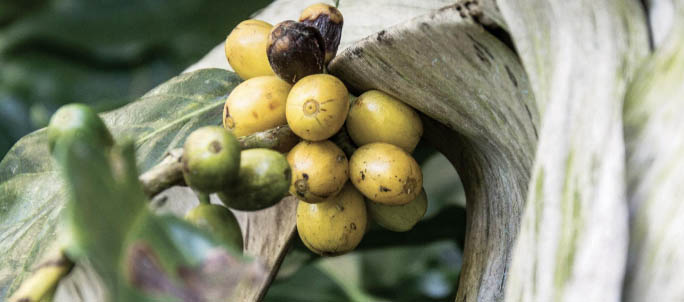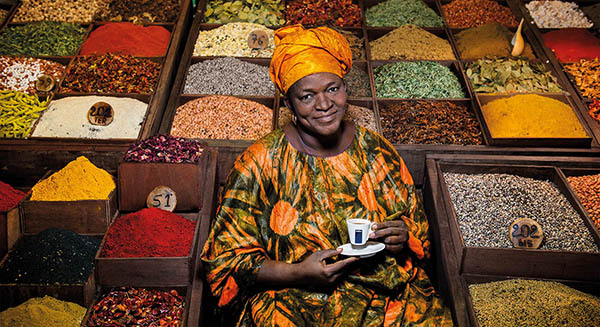Coffee Sapiens.
Innovation through understanding
Coffee Sapiens is a volume part of the Bullipedia series: the project from the elBullifoundation promoted by Ferran Adrià aimed at publishing an encyclopedia of the Western world’s fine-dining sector based on the Sapiens methodology.
This methodology is a holistic analysis process that allows to organise knowledge about a specific subject, with a historical, socio-political and socio-cultural approach.
Coffee Sapiens matter of study is coffee in all its forms and expressions. Our aim is to examine every aspect of coffee from a scientific and humanistic standpoint: from the growth of the coffee plant to the ecosystem in which coffee beverages are elaborated, from production to reaching the consumer, from the gastronomy venues to the consequences triggered by its consumption in Western society, along with its history.
Discover Coffee Sapiens through 4 thematic routes taken from the contents of the book
The unelaborated
coffee
The conformation of the Coffea plant, the flowering and ripening of the fruits. The processing phases of the unelaborated product before direct intervention on the bean. The agricultural set-up, cultivation practices and environmental impact. The origins and diffusion of the coffee plant in ancient times.
Visit route
The elaborated
coffee
The green bean and the phases of its so-called ‘processing’. The stages in the elaboration of the bean through roasting and grinding. The impact on aroma and the tasting techniques. The packaging and the transformation into an elaborated product available for purchase on the market. The history of trade deals in the coffee sector and the activity of exporters and buyers.
Visit route
Elaborations
with coffee
The evolution of the perception of coffee as a drink ready for consumption. The coffee variants from simple elaborations with water to all those that alter the tasting experience. Recipes, techniques and tools. Consumer habits and the different contexts of supply in the Western world.
Visit route
Coffee as a
gastronomic
space
The tasting experience analysed from a biological, physical-mental or cultural point of view. The coffee bar experience for the consumer and the manager. The advice for starting a successful gastronomic activity, from the offer of elaborations to all the elements that represent the identity of the restaurant.
Visit route
The unelaborated coffee
The conformation of the Coffea plant, the flowering and ripening of the fruits. The processing phases of the unelaborated product before direct intervention on the bean. The agricultural set-up, cultivation practices and environmental impact. The origins and diffusion of the coffee plant in ancient times.
Visit route
The elaborated coffee
The green bean and the phases of its so-called ‘processing’. The stages in the elaboration of the bean through roasting and grinding. The impact on aroma and the tasting techniques. The packaging and the transformation into an elaborated product available for purchase on the market. The history of trade deals in the coffee sector and the activity of exporters and buyers.
Visit route
Elaborations with coffee
The evolution of the perception of coffee as a drink ready for consumption. The coffee variants from simple elaborations with water to all those that alter the tasting experience. Recipes, techniques and tools. Consumer habits and the different contexts of supply in the Western world.
Visit route
Coffee as a gastronomic space
The tasting experience analysed from a biological, physical-mental or cultural point of view. The coffee bar experience for the consumer and the manager. The advice for starting a successful gastronomic activity, from the offer of elaborations to all the elements that represent the identity of the restaurant.
Visit routeThanks to the four thematic routes of Coffee Sapiens, you can analyse coffee as a plant (the unelaborated product), as a product elaborated by man (from green beans to ground coffee), as a beverage (the gastronomic elaborations) and as a gastronomic space (with a focus on the activity of a coffee bar).
You can browse Coffee Sapiens through the abstracts of its 14 chapters
Coffee Sapiens is a tool for the leaders in the coffee sector, but also for professionals in other areas of gastronomy who wish to deepen their understanding of what lies behind the cafeteria products. Furthermore, the informative language of the book makes it accessible to all coffee enthusiasts and coffee lovers who want to acquire a complete understanding of the subject.













